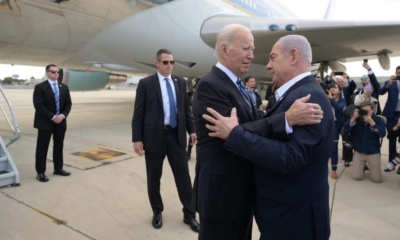
OpEds

War and protest: the major trends for 2023
With so many “black swan” events having occurred in the past few years, most commentators are staying away from predictions this year. Instead, they offer a list of major trends to watch out for in 2023. Here are my big five:
Ukraine and Russia
Obviously this is still the major issue to watch in 2023. It has become the core of all things risky and troublesome in the world. First, it’s a primary source of inflation – although, of course, the COVID-19 pandemic contributed to that as well – in the world today through food shortages and the energy crisis it has caused. This has led to a sharp rise in food and energy prices, and although energy prices have come down recently, they are still high. The resulting high inflation has led to instability, riots, and strikes throughout the world, from Europe to South America. In addition, it has led to increasing global geopolitical tension, as the war has, in effect, now become a North Atlantic Treaty Organisation (NATO) versus Russia proxy war, with NATO increasingly providing Ukraine with more sophisticated weapons. The most recent addition to Ukraine’s arsenal has been the supply of German, American, and British tanks, although the exact number is still not entirely clear.
The general consensus is that the current situation will remain until the spring, although it’s by no means quiet in the east of Ukraine, with fierce fighting and heavy casualties, but there are as yet no major offensives from either side. This will probably change in the spring as the weather improves. Everyone is predicting a major Russian offensive, which is why there has been such a rush to supply Ukraine with Western tanks in time. No one is sure, however, what the outcome of the spring offensive will be, and which side will emerge stronger. The most likely case is a continuing stalemate, but of course, that’s by no means certain. The spring offensive will be a key trend to watch.
Iran
The past year has been a difficult one for Iranian leadership. The huge protests that erupted over the death of Mahsa Amini, a young woman arrested for not wearing her headscarf properly, posed the biggest threat to its authority since it took power. It has managed to quell the protests by arresting nearly 20 000 people and sentencing dozens to death. University campuses, which were the centre of the protest, have become heavily guarded.
Iran’s economy, however, is in a shocking state. Inflation keeps rising. When the government inevitably has to reduce its petrol subsidy and prices of that key commodity rise, there will, no doubt, be renewed protest. Iran is key to the geopolitics of the Middle East, and instability there affects the whole region. Ongoing protests there are a key trend to watch.
Turkey
Turkey borders important countries in the Middle East, Europe, and the Black Sea. It’s a vital strategic country. It has also now become key to NATO expansion, by in effect holding veto over the accension of Finland and Sweden to NATO. It has played an important role as an intermediary to both sides in the Ukraine war.
Turkey is meant to hold an election in May, although there’s now talk of it being postponed due to the devastating earthquake that hit the country recently. If the election goes ahead, and is fair, President Recep Tayyip Erdoğan might lose, although the opposition has yet to unite around one credible candidate. If the opposition is able to put forward a dynamic and popular candidate, Erdoğan will face a serious challenge for the first time in many years. If the election does take place, May will be a very interesting month in Turkey, and another key trend to watch.
Israel
As has been discussed in numerous articles in the SA Jewish Report, Israel is going through a serious constitutional struggle between the executive and the judiciary. The proposed parliamentary “override law”, which will fundamentally overhaul Israel’s judicial system and which seems designed to directly protect Shas leader Aryeh Deri, has caused great unhappiness in Israel. The proposals have even led to the Bank of Israel as well as financial behemoth JP Morgan and some Israeli hi-tech executives warning that the proposed reforms will have a negative impact on the Israeli economy. Even more worryingly, a number of corporates have begun to move their money out of Israel in preparation for the proposal’s potential passage through the Knesset. Many Western leaders have also voiced their concern about the effect of the proposals on Israeli democracy.
The proposals and their passage through the Knesset are an important trend to watch this year. It’s hoped that common sense will prevail, and that those in power will ensure that the Israeli judiciary remains independent and an important guardrail against the excesses of parliamentary authority.
Africa
Finally, closer to home, some interesting trends in Africa include elections in Nigeria on 25 February, the biggest economy and most populous country in Africa, with an extremely fractious democracy. What’s interesting about this election is that one of the candidates, Peter Obi, a wealthy businessman and not from one of the two main parties, is riding high in the polls and getting huge support on social media and among Nigeria’s youth. If he wins, it could lead to a new trend in Africa of wealthy, independent businessmen winning elections, just as happened in Lesotho last year. It could also be a portent of what might happen in South Africa’s elections next year, with Herman Mashaba’s party also rising fast in the polls.
There are also elections this year in Zimbabwe and the Democratic Republic of the Congo (DRC), with a candidate who had a Jewish father showing strong support in the DRC. These three elections this year will set the trend for whether Africa is able to change from its current sclerotic leadership to something more dynamic, effective, and energetic.
2023 promises to be no less interesting and unpredictable than 2022!
- Harry Joffe is a Johannesburg tax and trust attorney.






